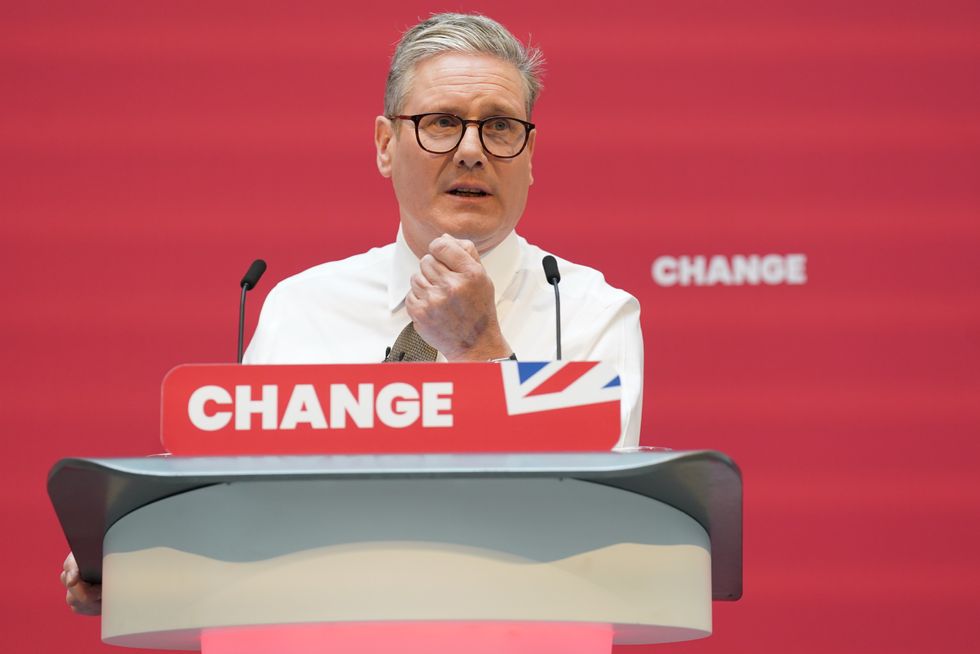While Keir Starmer may be leading in the polls, his campaign is characterised by a lack of clarity and consistency
PA
Starmer's campaign is characterised by a lack of clarity and consistency
Don't Miss
Most Read
Trending on GB News
Despite Keir Starmer running what can only be described as a notably vague and disingenuous campaign, he remains ahead in the polls. His recent promise to fix “up to” a million potholes annually is just one example of his ambiguous commitments. Meanwhile, Rachel Reeves, the Shadow Chancellor, has been evasive about whether investment and council taxes will increase, which has led to concerns among businesses about the future of UK investment, as highlighted by the Financial Times. Starmer's contradictory statements about taxes—pledging no new tax rises while simultaneously suggesting he would increase “specific taxes”—add to the confusion.
Starmer's stance on Great British Energy is equally perplexing. He claims that under his leadership, heating bills will decrease, yet his party has confirmed they will not issue new licenses for oil and gas exploration. This policy could lead to rising prices and energy shortages, mirroring the situation in New Zealand, where similar policies were initially implemented but later repealed due to their adverse effects.
The Labour campaign's rhetoric is filled with inconsistencies. While they try to present themselves as pro-motorist, they support measures such as the Ultra Low Emission Zone (Ulez), 20 mph zones, and the cancellation of new road infrastructure projects. This contradictory stance is just one example of how Labour is misleading voters.
Starmer’s immigration policy is another area where his campaign lacks clarity. He proposes creating a new Border Command to tackle people smugglers, leveraging his background in counter-terrorism to claim expertise. However, the reality is that a similar operational command already exists within the Home Office. His plan to cancel the Rwanda migration policy is also contentious. The policy is reported to have deterred migrants, with Irish politicians acknowledging that Rwanda has made the UK a less attractive destination, potentially strengthening the UK's negotiating position with France.

Starmer's campaign is characterised by a lack of clarity and consistency
PA
Scrapping the Rwanda initiative could leave the UK as the only major European country without a clear strategy to address mass migration, especially as the EU considers offshore processing. In contrast, Prime Minister Rishi Sunak has pledged to leave the European Convention on Human Rights (ECHR) if it blocks British law, presenting a stark difference in approach.
Starmer’s proposal to negotiate a returns agreement with the EU adds another layer of complexity. Despite occasionally suggesting otherwise, he has previously admitted that accepting EU migrants would be part of a reciprocal deal. Analysis from the Henry Jackson Society indicates that such an agreement could result in at least 127,000 more migrants coming to the UK annually, as part of the UK's share of EU migration. This potential influx contradicts Starmer's attempts to present his policies as clear and straightforward.
Throughout his campaign, Starmer has demonstrated a pattern of making vague promises and avoiding transparency on key issues such as energy, road infrastructure, council taxes, and immigration. His approach has been to obfuscate rather than clarify, leaving voters uncertain about his true intentions and the practical implications of his policies.
The inconsistency in Labour’s messaging is stark. On one hand, they claim to support motorists, yet their policies suggest otherwise. Their immigration strategy seems to be more about rebranding existing measures than introducing new, effective solutions. By pledging to cancel effective deterrent policies like the Rwanda plan, Starmer risks undoing progress made in controlling migration flows.
Moreover, Starmer's lack of transparency extends to economic policies. The ambiguity surrounding tax policies and investment plans creates uncertainty, which can have detrimental effects on business confidence and economic stability. His contradictory statements and unclear policy proposals raise serious questions about the reliability and effectiveness of his leadership.
While Keir Starmer may be leading in the polls, his campaign is characterised by a lack of clarity and consistency. His vague promises and evasive policy positions on crucial issues like energy, infrastructure, and immigration raise significant concerns about his ability to lead effectively. Voters deserve clear, honest, and straightforward commitments from their leaders, and Starmer's campaign falls short of this standard.







